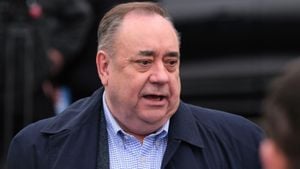Russian Defense Minister Andrei Belousov recently landed in North Korea, kicking off discussions aimed at deepening military cooperation between Moscow and Pyongyang. This meeting, held on Friday, points to rising alliances as Russia seeks to bolster its position amid the protracted conflict in Ukraine.
Details surrounding Belousov's agenda remain murky, with Russia's Defense Ministry failing to disclose specifics on his meeting’s participants or objectives. North Korean state media has not yet confirmed the visit either. Nevertheless, images released by the Russian Defense Ministry showcased Belousov alongside North Korean Defense Minister No Kwang Chol, receiving applause from military officials under banners of support for Russia.
Belousov’s visit follows closely on the heels of South Korean President Yoon Suk Yeol's discussions with a Ukrainian delegation, which included Defense Minister Rustem Umerov. This setup amplifies tensions, particularly as South Korea becomes increasingly concerned about North Korea's growing military engagements with Russia.
During his arrival, Belousov noted the strengthening military ties between the two nations and praised the strategic partnership agreement established between Russian President Vladimir Putin and North Korean leader Kim Jong Un. He emphasized the aim of this agreement: to stabilize the region and mitigate the risk of conflict, including nuclear war. Belousov described the partnership as demonstrating "the highest level of mutual trust" and expressed hopes for continued cooperation.
Echoing this sentiment, North Korean Defense Minister No reaffirmed support for Russia's military operations, characterizing them as part of a justified struggle for national sovereignty and security. His remarks come as North Korea increasingly positions itself as not only supportive of Russia's military actions but actively engaging with them.
The backdrop of these discussions includes reports from the United States and its allies, indicating North Korea has dispatched over 10,000 troops to Russia. There are apprehensions about some North Korean soldiers taking part in combat as they assist Russian forces. Concurrently, North Korea is suspected of providing military equipment like artillery systems to Russia—resources deemed invaluable as Moscow continues its conflict.
Political analysts observe these developments with growing concern. The prospect of increased cooperation between North Korea and Russia—aliens with substantial military capabilities—poses significant threats not just regionally, but globally. Leif-Eric Easley, a professor at Ewha University, suggested the meeting is far more than mere diplomatic niceties. He observed, "This visit indicates Putin and Kim’s military cooperation in violation of international law is about to increase." Such assessments forewarn significant consequences for the balance of power in the region.
Shin Wonsik, South Korea’s national security adviser, revealed on recent television appearances worrying specifics: from Russia providing North Korea with air defense systems to discussions around economic aid. He indicated Russia’s apparent offers of military technologies, which could critically affect North Korea’s capacity to bolster its nuclear arsenal. Reports suggest the North aims to develop satellite technology capable of enhancing its missile tracking systems aimed at South Korea—a known adversary.
It remains unclear precisely how these discussions might pivot the balance of military power within the region. South Korea has expressed intentions to respond proportionately to the growing cooperation between Russia and North Korea, linking its defense measures directly to the nature of this partnership.
Belousov's visit arrived against the backdrop of increasing military maneuvers. South Korea recently reported scrambling fighter jets as multiple Russian and Chinese warplanes operated near its air defense zones without violating territorial airspace. This incident reflects the heightened tensions generated by the shifting military dynamics.
To compound matters, the meeting between Belousov and North Korean leaders makes key strategic moves during what many view as the dawn of a new Cold War. Kim Jong Un has previously stated his desire to break North Korea's isolation, advocating for closer alignment with Russia as both nations confront Western nations and U.S.-led coalitions.
This rekindled partnership between North Korea and Russia raises significant alarm bells on various fronts. Concerns swirl around potential technology transfers which could see Russia fortify North Korea's existing arsenal. There’s also the worry of direct military collaboration infringing international protocols, potentially prompting wider military escalations.
Presumably, discussions also touched upon the unresolved question of how South Korea might respond militarily should situations escalate. Citizen fears of South Korea’s non-lethal arms policy growing obsolete might loom larger; South Korea has historically refrained from directly supplying arms to nations embroiled in conflict, but this tradition may soon be challenged.
All these geopolitical undertones reflect existing narratives where North Korea seeks to reinforce ties with nations opposing Western diplomacy. Reports indicate the North is strategically selecting partners who would assist its objectives amid significant global tensions. The recent exchanges and military engagements certainly demonstrate this alignment.
Looking forward, one can't ignore the broader ramifications of these developments. Not only are the geopolitical stakes heightened, but they also expose the fragile fabric of international relations—where alliances are formed by conflicting interests, often at the expense of global stability.
Meanwhile, international observers are tracking each of these developments closely. The potential ramifications on the balance of power, military readiness, and diplomatic relations will shape the future interactions of nations involved significantly. This backdrop raises the stakes for neighboring countries and international relations more broadly.
North Korea's renewed commitment to forge military paths with Russia could signify heavier arms supplies and improved military capabilities, thereby posing strategic threats to regional allies like South Korea and Japan.
The stakes are undeniably high, and the world watches closely to see how this partnership develops amid rising geopolitical tensions. Will we witness more military collaboration between these pariahs, and how will the United States and its allies strategize to counter this expansion of influence?



